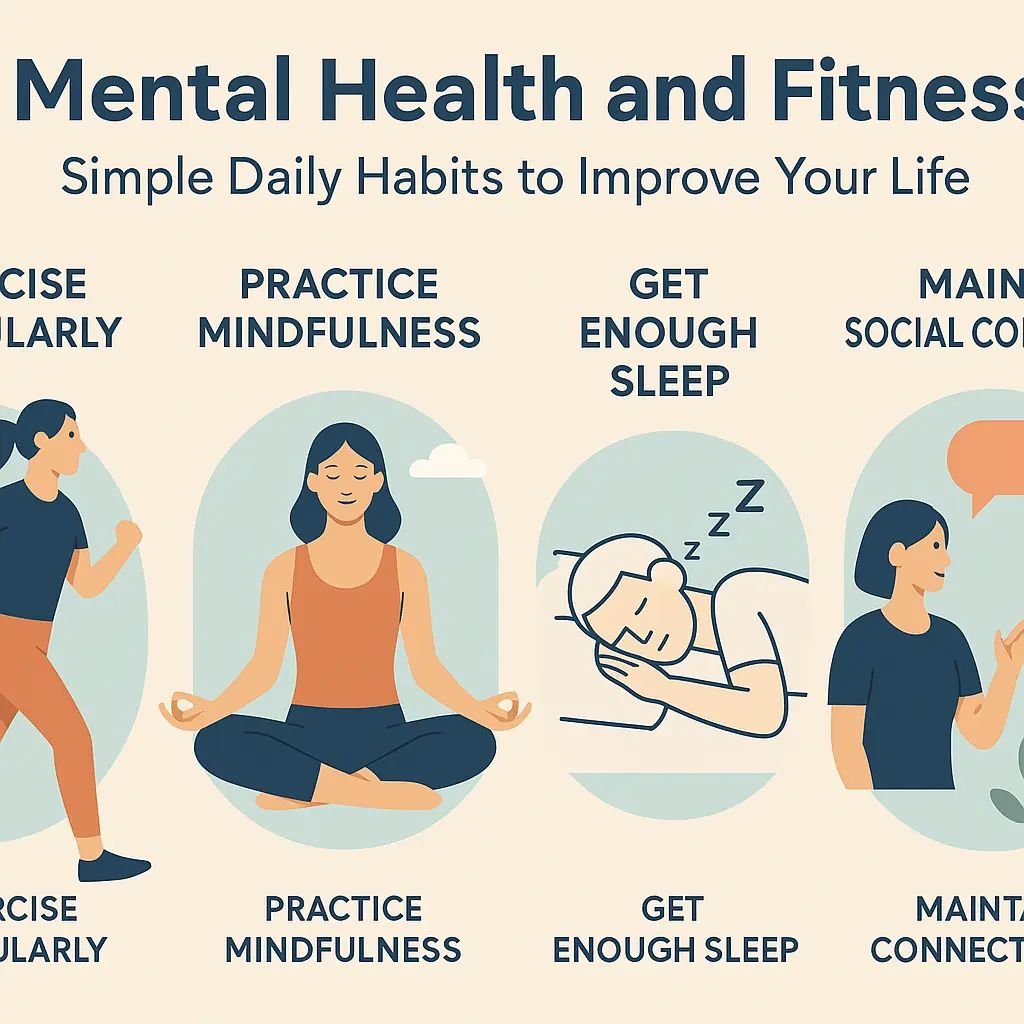Some of the links in this article are "affiliate links", a link with a special tracking code. This means if you click on an affiliate link and purchase the item, we will receive an affiliate commission.
The price of the item is the same whether it is an affiliate link or not. Regardless, we only recommend products or services we believe will add value to our readers.
By using the affiliate links, you are helping support our Website, and we genuinely appreciate your support.

Introduction: Why Mental Health and Fitness Matter
In today’s fast-paced world, more people are realizing the importance of mental health and fitness as part of a balanced lifestyle. While fitness is often associated with physical strength and appearance, it plays a vital role in emotional resilience and overall mental wellness. Similarly, taking care of mental health boosts motivation, improves focus, and enhances performance in physical activities.
This article explores practical ways to combine fitness and mental wellness, with easy-to-follow tips and routines for everyday life.
—
What Is Mental Health and Why It Matters
Mental health refers to our emotional, psychological, and social well-being. It affects how we think, feel, and behave daily. When mental health is strong, people can handle stress, build better relationships, and make healthier choices.
Unfortunately, stress, anxiety, and depression are common challenges worldwide. By practicing emotional resilience techniques, people can strengthen their ability to adapt to difficulties, bounce back from setbacks, and enjoy a higher quality of life.
👉 According to the World Health Organization (WHO), mental health is a fundamental component of overall well-being.
The Connection Between Mental Health and Physical Fitness
Research consistently shows a strong link between physical fitness and mental health. Regular exercise improves mood, reduces stress hormones, and stimulates the release of endorphins—the body’s natural “feel-good” chemicals.
👉 A study from Harvard Medical School confirms that exercise is an effective natural treatment for depression and anxiety.
A personalized fitness plan for mental health can:
Reduce symptoms of anxiety and depression
Improve sleep quality
Boost energy and productivity
Strengthen self-confidence
Even light exercises such as walking, stretching, or yoga can significantly improve mental wellness when practiced consistently.
Daily Mental Health Tips You Can Start Today
Mindfulness Exercises for Beginners
Mindfulness is the practice of staying present in the moment without judgment. Simple mindfulness exercises include:
Deep breathing for 5–10 minutes
Focusing on body sensations during a short walk
Guided meditation through mobile apps
👉 The American Psychological Association (APA)
How to Reduce Work Stress Naturally
Instead of relying on caffeine or unhealthy habits, try:
Short breaks during the workday
Listening to calming music
Setting boundaries for work-life balance
Self Care Ideas for Mental Health
Journaling thoughts and gratitude
Spending time in nature
Limiting screen time before bed
Simple Home Workout for Beginners
Home Workout for Beginners No Equipment
If you’re new to fitness, bodyweight exercises are enough to build strength:
Push-ups
Squats
Planks
Jumping jacks
These movements require no gym and can be done in a small space.
10 Minute Daily Fitness Routine
Even with a busy schedule, a short 10-minute workout can improve health. Try:
1. 2 minutes jumping jacks
2. 2 minutes squats
3. 2 minutes push-ups
4. 2 minutes plank
5. 2 minutes stretching
👉 The CDC recommends at least 150 minutes of moderate physical activity per week, which can include home workouts.
Flexibility Exercises for Tight Muscles
Stretching reduces injury risk and supports mental relaxation. Add simple stretches such as hamstring stretches, child’s pose, and shoulder rolls.
Nutrition, Sleep, and Lifestyle Habits
Balanced Diet and Light Exercise Tips
Eat whole foods: fruits, vegetables, lean proteins, whole grains
Stay hydrated with at least 2 liters of water per day
Avoid processed sugars that spike energy and crash mood
👉 Healthy nutrition is strongly linked to mental well-being (NIH).
Improve Mental Clarity and Focus
Good sleep hygiene and proper nutrition help boost concentration. Limit late-night screen use and aim for 7–8 hours of quality sleep.
👉 The Sleep Foundation recommends 7–9 hours of sleep for adults.
How to Build a Sustainable Routine
Creating a long-term mental wellness routine at home is essential. Start small:
1. Pick one daily workout (5–10 minutes).
2. Practice mindfulness or journaling in the morning.
3. Plan meals in advance.
4. Set a consistent bedtime.
👉 The Mayo Clinic emphasizes the role of balanced routines in long-term health.
Consistency builds habits, and habits lead to transformation.
Common Mistakes to Avoid
Pushing the body too hard without rest
Ignoring mental health while focusing only on physical fitness
Skipping sleep for late-night workouts or work tasks
Following unrealistic diets that harm both body and mind
Conclusion: Small Steps Lead to Big Results
Mental health and fitness are deeply connected. By integrating simple daily habits—like short workouts, mindfulness exercises, balanced meals, and consistent sleep—you can significantly improve your overall well-being.
Remember: progress is built on small, sustainable steps. Start today with one change, whether it’s a 10-minute exercise or a mindful breathing session. Over time, these small actions create lasting results in both mental wellness and physical fitness.